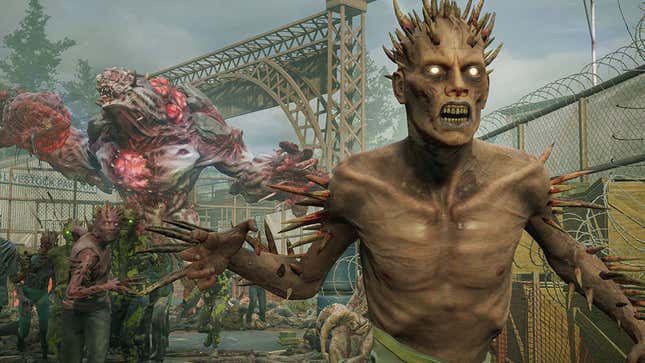
Earlier today the developer behind co-op shooter Back 4 Blood--released in 2021 on console and PC—announced that, having released multiple updates and three expansions, it was moving on. And the reaction to this was mostly negative, with players calling the game dead and suggesting the team was giving up on it. But really, I’m fine with devs making games, supporting them for a bit, and then moving on. Not everything needs to be a live-service game like Fortnite or GTA Online. In fact, I kind of miss those halcyon days when studios were allowed to move on and do something new.
Released in October 2021, Back 4 Blood is a Left 4 Dead-like zombie shooter developed by Turtle Rock Studios, the team behind the first Left 4 Dead. And yeah, Back 4 Blood wasn’t as good as its spiritual predecessors. But it wasn’t a trainwreck, either. In fact, I had a lot of fun with the game, and have since gone back a few times to replay it with friends for many hours of fun. It also got three expansions, adding new content while also fixing some bugs and balance issues.
Now, a year and a half later, the devs are moving on to something “bigger, bolder, and better” and I’m excited to see what that is. Back 4 Blood isn’t shutting down or being killed. It will remain playable across all the platforms it was released on. The game lives on while the team behind it gets to make something else. And this is how it used to work.
Before let’s say, 2013, games could be released, supported for a bit, and then the developer could move on. Rarely did people bat their eyes at this. Nobody expected a developer to stick with a single game for five, seven or 12 years. There were some exceptions, of course, big MMORPGs like EverQuest II or insanely popular PC games like Counter-Strike or The Sims. But those were rarities. For a long time games launched, people played and enjoyed them, and devs moved on. Maybe if a game was really good and sold very well, it might get an expansion. But a lot of the time hit games never got more content or seasons, and players were fine with that.
Halo 3 got a handful of map packs and then Bungie moved on, but players kept playing the original version of the game until the Xbox 360 servers shut off. Nintendo 64 Smash Bros didn’t get any big post-launch content updates—it being on a cartridge probably didn’t help—but it continues to be popular. I remember playing Tony Hawk’s Pro Skater 3 for years after it was released. Today, if a game stops getting support even a few years after launch, people will call it “dead” or “mid” or harass the devs.

Now, to be clear, online games shutting servers down after only a year or two is terrible and should be criticized. (I’m looking at Epic and its recent shutdown of Rumbleverse.) But beyond that, I just don’t think it’s needed or healthy for the game industry to become focused only on creating “service”-oriented Fortnites and Rainbow Six Sieges. Not every game—even multiplayer games—needs to be updated endlessly for years and years. This would also mean fewer games would need to be pumped full of in-game stores or cosmetic skins to help offset years of never-ending development.
And it’s not like Turtle Rock came out in 2021 and promised a decade of content for the game. The studio made a zombie shooter, released it, created some DLC, fixed bugs, and now is moving on. If you want to play Back 4 Blood it’s still there. Turtle Rock not adding another big expansion doesn’t hurt anything.
Look, I love a good live-service game. I play Destiny 2 all the time. It’s awesome having a game that grows and expands over time. However, not all of my games need to do this. Surprise-hit musical action platformer Hi-Fi Rush is awesome and if it never gets any DLC or expansions, it will still be awesome. This constant hunger for content isn’t what we need right now and it would really help if more people were okay with games not going on forever. A developer moving on from a project shouldn’t automatically equal failure. Instead, it should just be a normal part of the industry. Like it used to be.